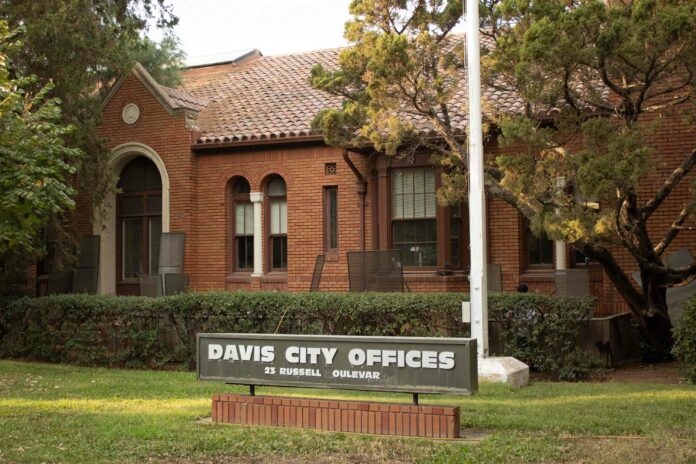Davis students and activists discuss how the measure may help or harm the city
Everyone registered to vote in Davis for the Nov. 3 elections will see Measure B on their ballot. The measure proposes that a new campus, the Davis Innovation and Sustainability Campus (DISC), be built on the northeastern corner of Davis, covering about 200 acres of land. For those in favor of the bill, the goal of the proposed development is to attract innovation, contribute to Davis’ affordable housing and improve city amenities. It will use “100 percent renewable energy” in the process, according to the Yes on B website. Some in support of the measure, like Gwen Chodur, a fifth-year nutritional biology PhD candidate, believe that the new campus will provide a space for students who want to expand their research.
“My vision of Davis with Measure B […] is a place where there is a pipeline for industry and innovation from the university,” Chodur said. “And so graduate students specifically can build on the work that they’ve done during their dissertation and bring it to market.”
Jonathan Minnick, a third-year musicology PhD candidate, believes that UC Davis is currently lacking what Measure B might provide, and that leading universities set an example for what Davis could look like if the DISC were built.
“Many of the world’s top universities have a similar campus to what is proposed by the DISC, and it works so well because of the proximity,” Minnick said, via email. “It allows for innovation and opportunities that are currently unavailable to Davis students and researchers.”
A main topic of consideration when looking at the DISC is its promise of environmental sustainability. Minnick sees the proposal as addressing concerns the community might have relating to global warming, and becoming a place where climate research could eventually take course.
“The focus on sustainability is also critical—we are facing a huge problem with climate change, worldwide and in California, and finding ways to address it is the only way we can truly think about the future,” Minnick said.
Others, like Alan Pryor, the current chair of the local Sierra Club Yolano Group and member of the City of Davis Natural Resources Commission, have expressed concern around the possible carbon emissions of vehicles traveling to and from the DISC, and how this relates to the city’s goal of reaching carbon neutrality by 2040.
“The only way they’re going to get to neutrality, because 80% of the CO2 emissions are directly related to traffic, is to take a huge bite out of the traffic that’s going to or from the project,” Pryor said. “We’re living in a world now where we’ve seen the largest fires ever in the Pacific Northwest, Siberia, Australia and the Amazon, and we’re seeing the greatest number of ice melts ever in Antarctica and Greenland. And we’re sitting here talking about increasing the city of Davis’ carbon footprint by 8% for this one single project. It’s simply unacceptable. It’s madness.”
In addition to his concerns about climate change, Pryor expressed his belief that Mace Boulevard, the major roadway that would lead to the development, wouldn’t look the same after its construction.
“I see the entire Mace Boulevard corridor being hopelessly congested,” Pryor said. “They really haven’t proposed any significant mitigation for that in terms of either expanding Mace Boulevard or its capacity.”
Minnick, however, believes that the benefits of Measure B outweigh possible traffic backup, which he says can be fixed.
“The traffic issues that people bring up are fixable, and if we only approved projects based on traffic, the town would not grow or change whatsoever from what we see today,” Minnick said. “It totally ignores many of the benefits that Measure B brings to our town.”
Roberta Millstein, a philosophy professor who is also affiliated with the UC Davis John Muir Institute of the Environment, rejects the notion of sustainability the measure puts forth, saying that a lack of public transportation would be problematic for levels of carbon emissions.
“The supposed ‘green jobs’ that the DISC would produce are based on empty promises,” Millstein said, via email. “Any project that plans on 5,600 parking spaces without any good public transportation options—clearly a commuter-oriented venture—cannot be said to be providing green jobs.”
Despite the arguments against Measure B, for Chodur, the potential construction of the DISC would create the possibility of a lasting, beneficial space that would encourage students to remain in Davis after graduation.
“As a graduate student, I want [DISC] to be in Davis because this is a way for students to be able to stay in the community to really build a community,” Chodur said. “Having this new option for what will be very high skill jobs speaks to the potential to keep students here who want to stay here and […] to continue to maintain the community that they’ve built, but then also to be able to give something back to the city that a lot of us really care about.”
Written by: Lyra Farrell — features@theaggie.org






